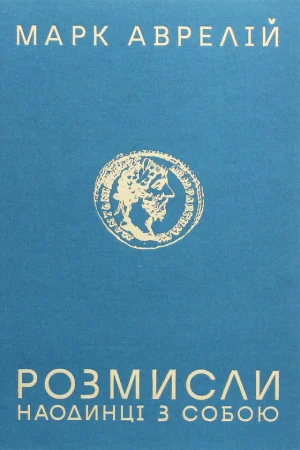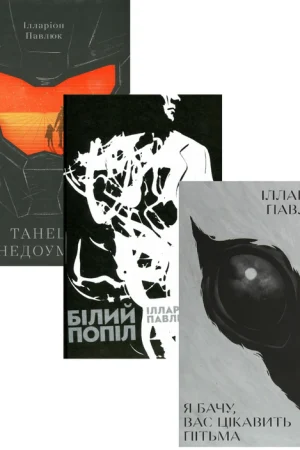 Reflections. Alone with myself
Reflections. Alone with myselfBuy Ukrainian Books / Fiction / Reflections. Alone with myself
Buy Book "Reflections. Alone with myself" in Ukrainian
$22.95
Free Shipping Worldwide
for orders over $4999

Розмисли. Наодинці з собою
Марк Аврелій Антоній
Marcus Aurelius Antonius
Reflections. Alone with myself
Discover the Secrets of Life and Death
Buy “The Secret of Life and Death” by Svitlana Roiz to explore profound themes that resonate with readers in the US and Canada. This book delves into the mysteries of existence, offering insights that can transform your understanding of life.
Why You Should Read “The Secret of Life and Death”
Here are some compelling reasons to purchase “The Secret of Life and Death” in Ukrainian:
- Engaging Narrative: The story weaves together elements of spirituality and real-life experiences.
- Life Lessons: Each chapter presents valuable lessons about love, loss, and the human experience.
- Cultural Perspective: Gain a unique view on existential questions from a Ukrainian author.
- Introspection: Encourages self-reflection and deeper understanding of personal beliefs.
- Universal Themes: Explores themes relevant to everyone, regardless of cultural background.
Where to Buy
If you’re looking to buy “The Secret of Life and Death” by Svitlana Roiz, you’ve come to the right place. Our store offers:
- Best Prices: We provide competitive pricing on all titles.
- Good Discounts: Frequent promotions on selected books.
- Fast Shipping: Orders are shipped directly from Kyiv and Lviv for quicker delivery.
- Worldwide Shipping: We use trusted services like Ukrpost, USPS, UPS, and DHL.
Payment Options
We accept a variety of payment methods to make your purchasing experience seamless:
- PayPal
- Visa
- Mastercard
- Any other banking cards and accounts
Additionally, a portion of each purchase goes to support the Ukrainian army. Get your copy of “The Secret of Life and Death” today and experience its enriching content. It’s not just a book; it’s a journey into understanding the essence of life!
Additional info
| Weight | 0.15 kg |
|---|---|
| Year | |
| Cover | |
| Pages count | 208 |
| Page size | 145 |
| Original title | Розмисли. Наодинці з собою |
| Author |
Related Categories
4 reviews for Reflections. Alone with myself
5
/5Based on 04 rating(s)
Customer's reviews
Sort by
-
Volodymyr Yeremenko
For me personally, the history of the Roman Empire, which lasted a thousand years and became for mankind the cradle of progress and advanced thought, the birthplace of modern state institutions, social structure, law, art, religion, etc., etc., is of great interest.
It is common in historiography to divide ancient Roman emperors into the “good” and the “bad. Marcus Aurelius is considered one of the most virtuous emperors. Marcus Aurelius came from a noble senatorial family, he was well-educated; from his early years he held a number of important elective offices (quaestor, three times consul), studied philosophy and law; he became emperor in 161, ruled with Lucius Verus until 169, and then independently till 180. Marcus Aurelius remains in history as a good ruler, general and stoic philosopher.
What made Marcus Aurelius a good ruler, besides his talent and outstanding intelligence, in my opinion, was above all his respect for state institutions. Unlike other rulers of ancient Rome, Marcus Aurelius never tried to remove the Senate from the government, he understood and strengthened the judicial branch, developed education and state support for children of poor parents and orphans, etc.
As a military leader, conducted a victorious war with Parthia, annexing part of Mesopotamia and making Armenia a client state. Deterred attacks of Germanic tribes in the north and northeast of the empire. Barbarians invaded a number of provinces in the Balkans and through the Alpine passages penetrated into Northern Italy as far as Aquileia. Marcus Aurelius led a campaign against the Germans and was very successful. But during this campaign the emperor died of the plague in Pannonia in 180.
As a philosopher, Marcus Aurelius left his notes, which are included in the proposed book. Marcus Aurelius’s system of views on various aspects of human relations, morality, law, mutual understanding, mutual assistance, attitude toward business, contempt for vanity, excess, immodesty, etc. is an example of a holistic wise perception of the world, relevant today, and will probably be of interest not only to philosophy buffs, but to all readers interested in history.
One of Marcus Aurelius’ maxims is: “One should once and for all put an end to the debate about what a good man should be, and just… become one.
January 11, 2022Verified PurchaseHelpful?
Reply -
Natalia Bogdan
Marcus Aurelius was the last of Rome’s “five good emperors” from the Antonine dynasty. This chain broke with him, because his son Commodus inherited power, who was not known for patience, justice, or other virtuous traits. Therefore, if Marcus Aurelius was indeed as virtuous as his contemporaries describe him and ruled according to the principles described in his Meditations, then the people of Rome of that time can only envy him for having had the opportunity to live in such an era.
Marcus Aurelius argues that there is nothing new in the world: everything is mundane and transient, everything is vanity of vanities, and among these things it is important to maintain goodwill and good mood, realizing that the value of each person is determined by the value of the things he or she does. And it doesn’t really matter who you are in your life, whether you are a master or a slave, it only matters how you perceive the world around you, and whether you do good for the public good, whether you don’t harm your neighbor. Because when you seek to do evil to someone else, you destroy your own soul first and foremost.
Many things that exist today have existed in the past; some people have replaced others, it is always the same drama of life, only different actors and performers… And everyone will disappear in due time, dissipate, and new ones will take their place, which will also be just a point in eternity. Therefore, everything should be taken lightly, without complaints and complaints, and is it worth wasting precious time on unimportant things?
I really liked the book. It is surprising that after the ancient times, when people understood the nature of life so subtly, such a dark age of the Middle Ages could come.
July 12, 2020Verified PurchaseHelpful?
Reply -
Alex
What is the difference between the greats of today and the greats of the past? First of all, perhaps, the fact that the politicians of the past sought to leave their mark on history, that they really ruled their country and cared about its present and future. Marcus Aurelius Antony is one of the most famous emperors of the Roman Empire, whose reign was in the period before Christ. Marcus Aurelius was not only a ruler, he is also known as a philosopher and a talented writer. Thanks to his writing talent, we can learn about the worldview and life position of the leader of the greatest state in the world at that time.
This book is the emperor’s personal notes, expressing his views on the model of behavior that an emperor should follow, thinking not of his own welfare but of the welfare of the society and the state he leads. The book consists of twelve parts, in which the author reflects on life and death, on the purpose of man and his place in this world. His book is dominated by the themes of humanism, long before the emergence of this era. The main thesis of the reflections on man is the idea of the immutability of human nature, regardless of the change of epochs.
June 2, 2020Verified PurchaseHelpful?
Reply -
Taras Gr
The book “Reflections, Alone with Myself” by the prominent Roman emperor Marcus Aurelius is truly impressive. The author’s personality itself inspires respect – he was the ruler of the almighty Roman Empire at the height of its power in the second century AD, who carried out reforms and fought many barbarian invasions. For us, he is also known as a character in the popular movie Gladiator, where Marcus Aurelius is killed at the beginning by his son, the next emperor Commodus (this did not actually happen and Commodus loved and respected his father). This ruler, staying in the then wild border empires on the Danube, fighting Germanic tribes, began to write down his own thoughts. And here are the results of his work. Marcus Aurelius did not plan to disseminate his thoughts, but they were preserved and began to be quoted a couple of centuries later. However, his contemporaries already respected the emperor as a recognized thinker and gave him the nickname “philosopher.”
The emperor was a supporter of Stoic philosophy, so you will find in the book many thoughts about fate, patience, self-belief, and perseverance in the face of obstacles. They often have an air of doom and skepticism, because the Stoics did not believe in the possibility of human resistance to the verdicts of fate. There is no annoying preaching or moralizing here. In general, when reading Reflections, one realizes that even such a powerful person had such deep emotional experiences from which no amount of power or wealth could save him, and he did not have any tragedies in his life.
The book makes you think about yourself, about your destiny, and even teaches you to be resilient in the face of life’s hardships. A great work for self-reflection! Full of psychological meanings.
The edition is very well done, with a good translation accompanied by detailed notes at the end of each page explaining many concepts. The book also contains interesting illustrations.
I advise everyone to buy it and immerse themselves in these reflections, both those of the emperor and their own, inspired by these profound ideas!
May 12, 2020Verified PurchaseHelpful?
Reply



![Buy {title[1]} in Ukrainian](https://uabooks.us/wp-content/uploads/2024/07/1984-300x450.jpg)

Leave feedback about this